【备课参考】(人教)高中英语必修5同步教学课件:Unit 4 Making the news Workbook(共47张PPT)
文档属性
| 名称 | 【备课参考】(人教)高中英语必修5同步教学课件:Unit 4 Making the news Workbook(共47张PPT) |
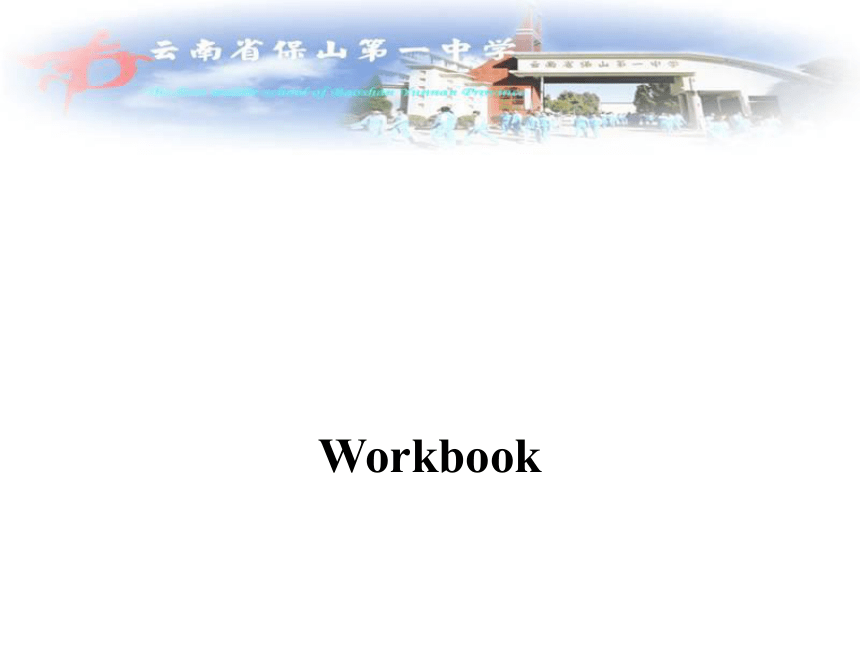
|
|
| 格式 | zip | ||
| 文件大小 | 641.6KB | ||
| 资源类型 | 教案 | ||
| 版本资源 | 人教版(新课程标准) | ||
| 科目 | 英语 | ||
| 更新时间 | 2015-07-29 00:00:00 | ||
图片预览

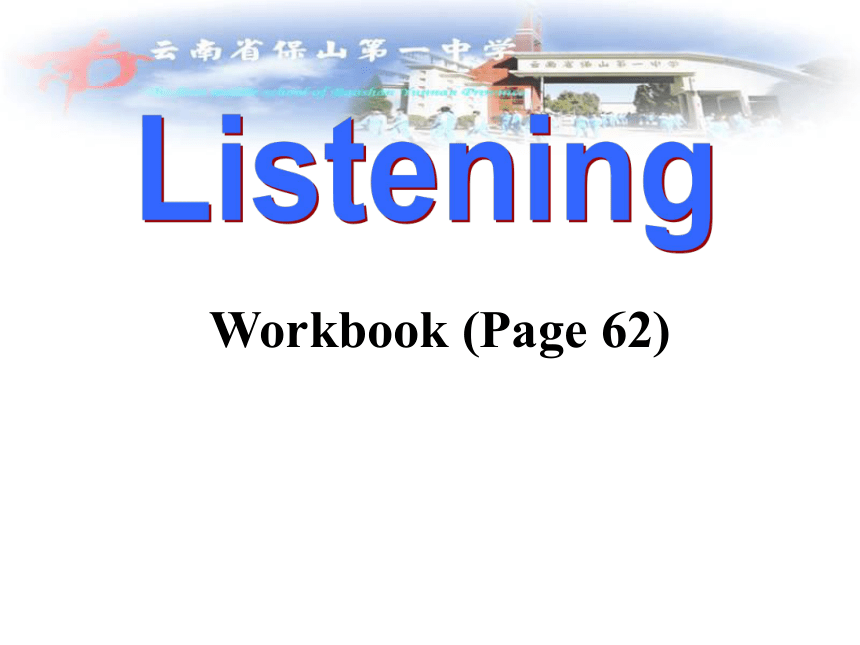
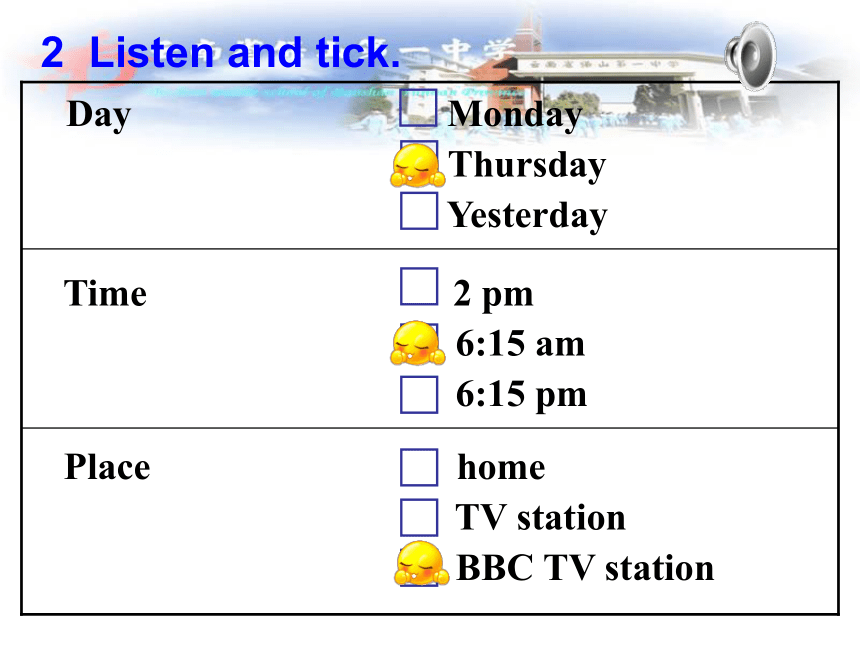
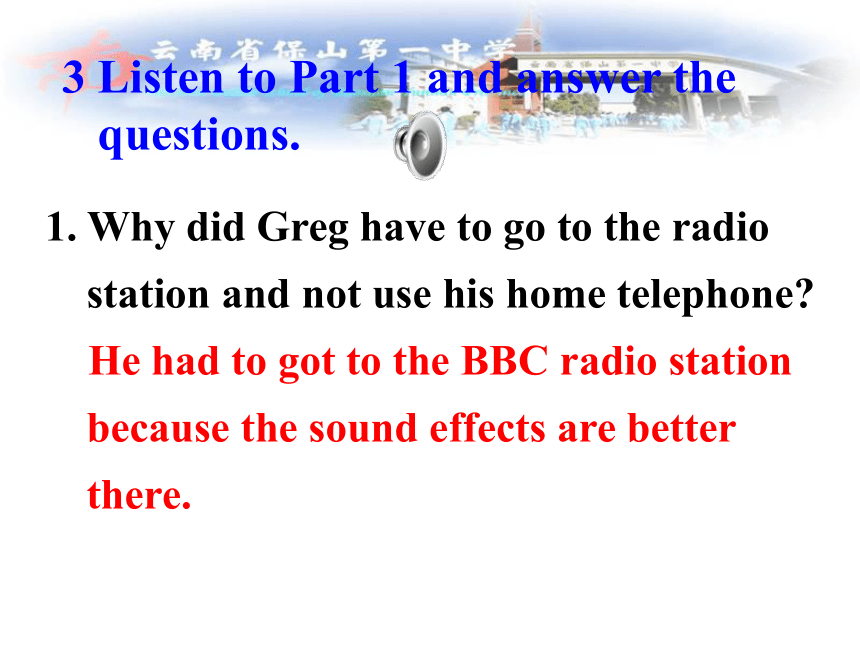
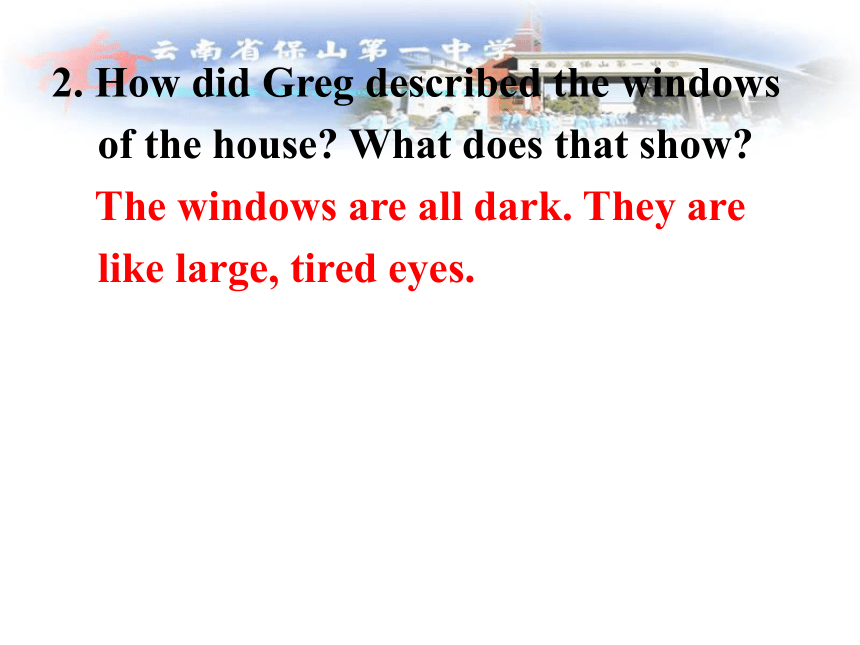
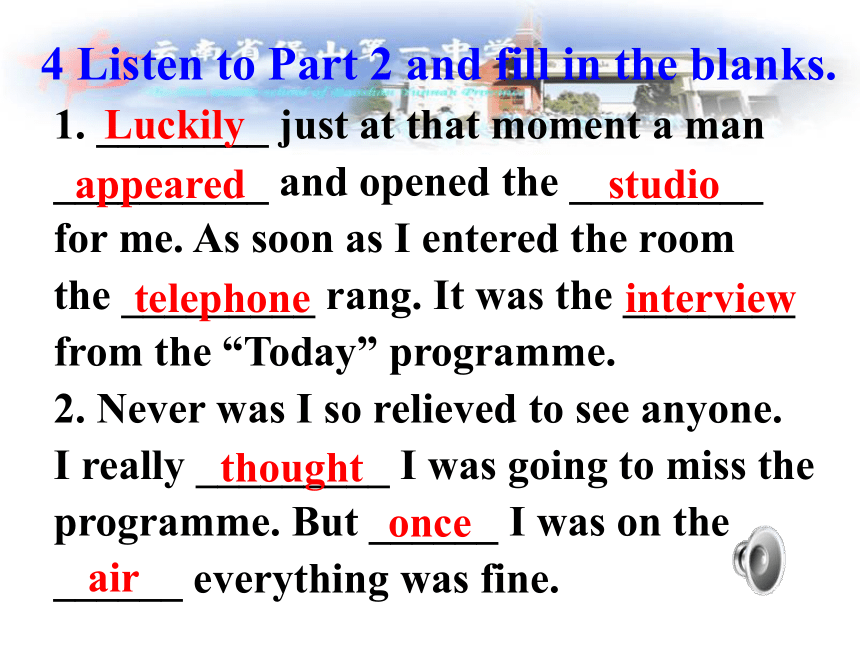
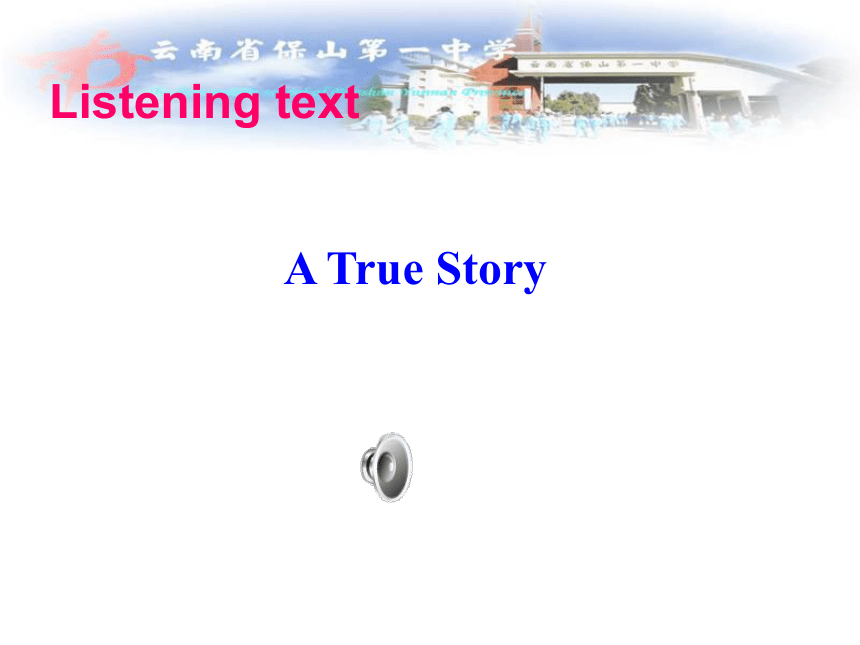
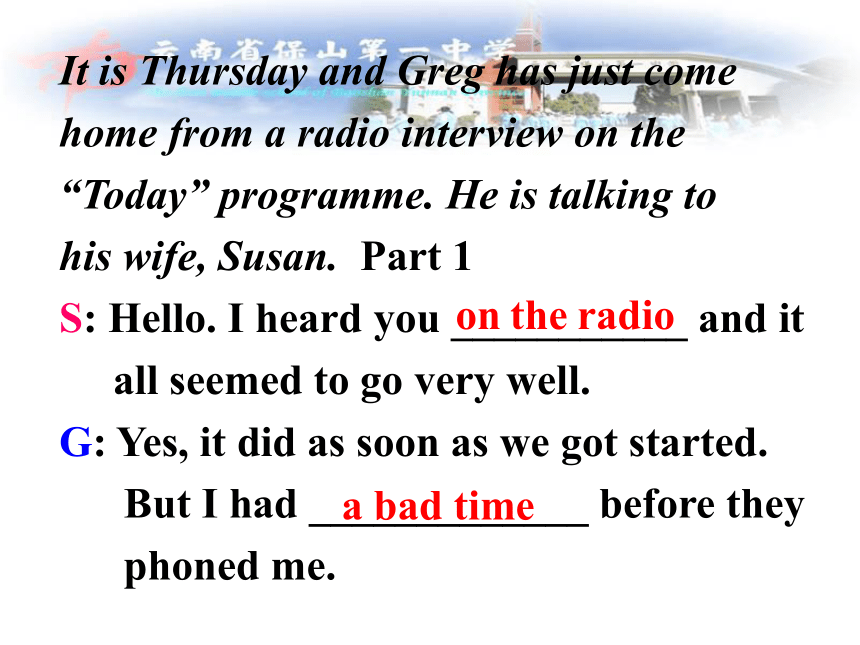
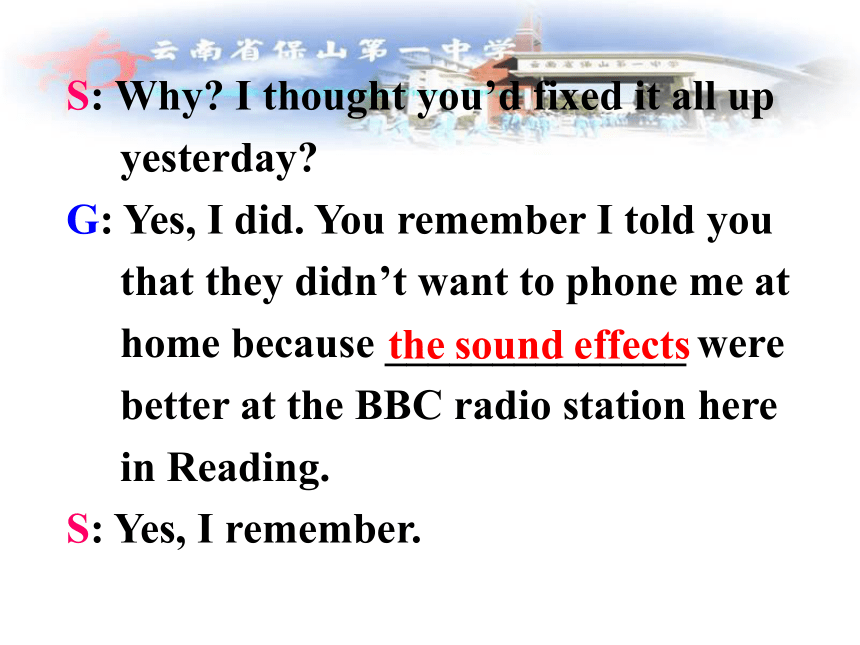
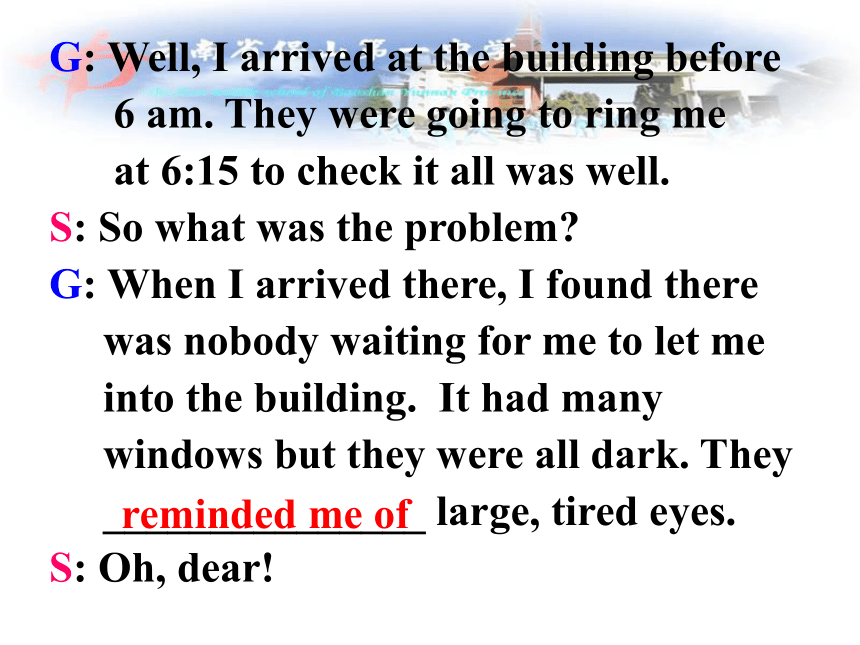
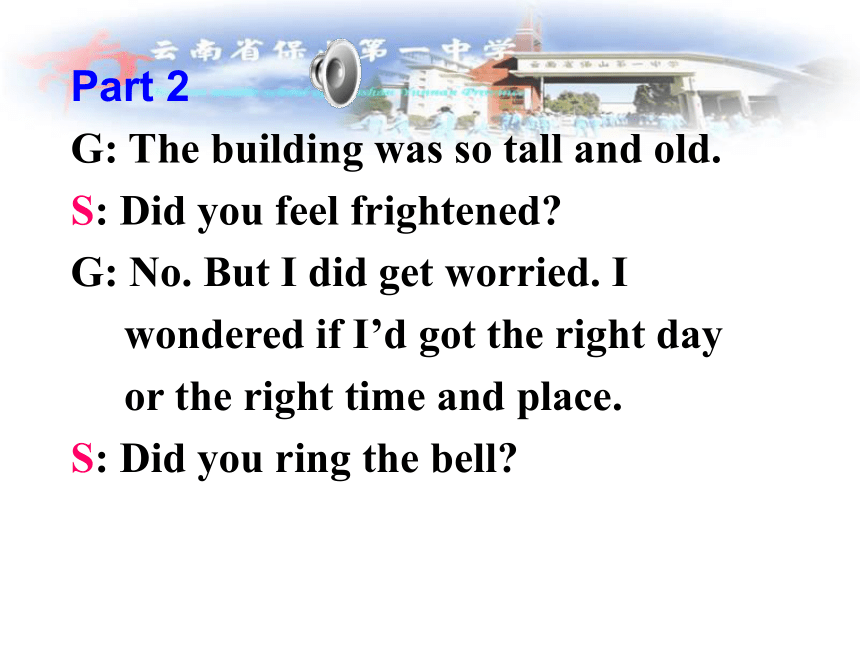
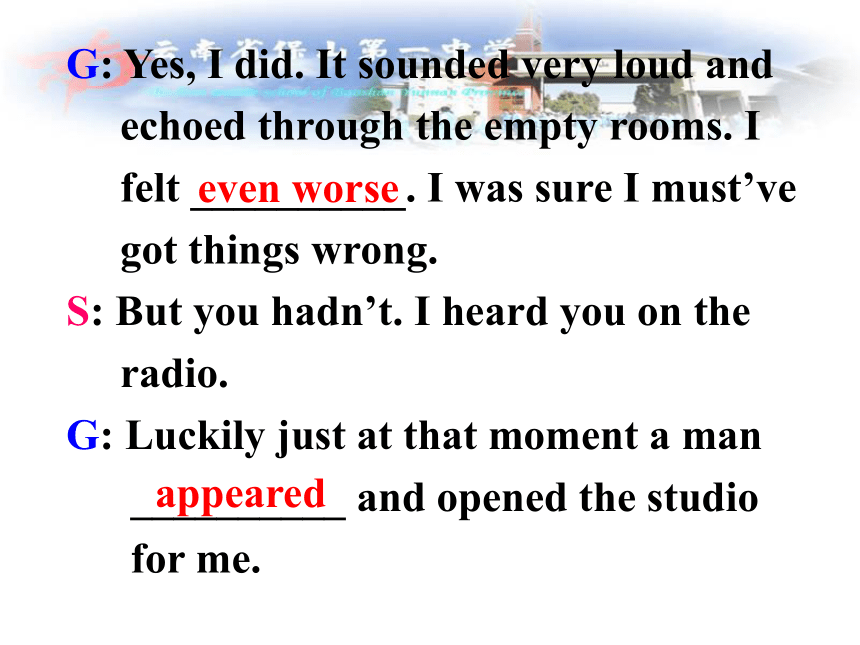
文档简介
课件47张PPT。Unit 4
Making the news
Workbook ListeningWorkbook (Page 62)2 Listen and tick.Day Monday
Thursday
Yesterday Time 2 pm
6:15 am
6:15 pm Place home
TV station
BBC TV station1. Why did Greg have to go to the radio station and not use his home telephone?
He had to got to the BBC radio station because the sound effects are better there. 3 Listen to Part 1 and answer the
questions.2. How did Greg described the windows of the house? What does that show?
The windows are all dark. They are like large, tired eyes.1. ________ just at that moment a man
__________ and opened the _________
for me. As soon as I entered the room
the _________ rang. It was the ________
from the “Today” programme.
2. Never was I so relieved to see anyone.
I really _________ I was going to miss the
programme. But ______ I was on the
______ everything was fine.4 Listen to Part 2 and fill in the blanks. appearedLuckily studiotelephoneinterview thoughtonceairListening textA True StoryIt is Thursday and Greg has just come
home from a radio interview on the
“Today” programme. He is talking to
his wife, Susan. Part 1
S: Hello. I heard you ___________ and it
all seemed to go very well.
G: Yes, it did as soon as we got started.
But I had _____________ before they
phoned me.on the radioa bad timeS: Why? I thought you’d fixed it all up
yesterday?
G: Yes, I did. You remember I told you
that they didn’t want to phone me at
home because ______________ were
better at the BBC radio station here
in Reading.
S: Yes, I remember. the sound effectsG: Well, I arrived at the building before
6 am. They were going to ring me
at 6:15 to check it all was well.
S: So what was the problem?
G: When I arrived there, I found there
was nobody waiting for me to let me
into the building. It had many
windows but they were all dark. They
_______________ large, tired eyes.
S: Oh, dear! reminded me ofPart 2
G: The building was so tall and old.
S: Did you feel frightened?
G: No. But I did get worried. I
wondered if I’d got the right day
or the right time and place.
S: Did you ring the bell? G: Yes, I did. It sounded very loud and
echoed through the empty rooms. I
felt __________. I was sure I must’ve
got things wrong.
S: But you hadn’t. I heard you on the
radio.
G: Luckily just at that moment a man
__________ and opened the studio
for me. even worseappeared As soon as I entered the room the
telephone rang. It was the interview
from the “Today” programme.
S: So all’s well that ends well?
G: Yes, thank goodness. Never was I so
relieved to see anyone. I really
thought I was going to miss the
programme. But once I was on the
air everything was fine.TalkingArrange a meeting on the phone (P62).Which day would suit you best?
I would like to arrange …
What time would be most convenient?
That will/won’t be convenient because …
I can/can’t do that because …Where would you like to meet?
I suggest that we meet …
I may be able to see you at …?
Please, can you tell me …?
I look forward to seeing you.S1: Good mooning. This is the secretary of Zhou Jie. Can I help you?
S2: Is it possible to make an appointment to interview her?
S1: Who is that?Sample dialogueS2: I am the representative of a company which produces Look bright beauty products. We would like to arrange for her to do some work for us and help sell our goods.
S1: OK. She is very busy working on a film at the moment. What about next week? Which day would suit you best?S2: Tuesday and Thursday are better. Does that suit her?
S1: Well, her diary is empty for Tuesday so she may be able to see you then. What time would be most convenient?
S2: Any time that day?S1: Then I suggest you meet at 2pm.
S2: OK. Where would she like to meet?
S1: At the Apollo Theatre perhaps?
S2: I look forward to seeing her at the Apollo Theatre at 2 pm on Tuesday. Thank you. Goodbye.Reading Task
(Page 65)Searching for the truthAs a news reporter, one has to make sure
that the story is true. Otherwise, the writer
will be accused of guilty. As a reader, one
also has to find out whether the story is
true. So no matter what you are, you have
to find out the truth. How can we find the
truth?the reporters were there at the time.primary sourcesfrom the person presenting the
programmer in the studiosecondary sources Where does the best information come
from?
2. What are primary sources?
3. What are secondary sources?
those who were there at the time.the writings of the people who
lived there.the writings of people at a much later
date who write about the same events.Answer the questions. 4. What sources are included in a
newspaper?
5. Why is it important to separate
primary and secondary sources?Because they can help us to decide
what is a fact and what is an opinion.both the primary and the
secondary sourcesTrue or False?When we read about Jia Sixie in our textbook we are reading a primary source.
2. As we watch the news on TV, the person presenting the programme in the studio is the secondary source.FT3. Photographers sometimes are both primary and secondary sources.
4. Knowing the difference of primary and secondary sources can help us decide what is a fact and what is an opinion.
5. Often facts and opinions are mixed in any report.TTFThe person who has written the news should be there at the time. Primary sources and secondary sources are very important for finding out the truth. The closer a person is to the event they describe in time or geographically, the more likely they are to be accurate.TipsA primary source depend on:TASKNow you have been asked to recommend a primary source from these writings about Julius Caesar, a Roman leader. Only one of them is a primary source so you must look at them carefully. Remember dates are very important. Tick the correct boxes. Then think which of them will have fewer facts and more opinions. Give a reason.1 Life of Julius
Caesar(100 BC-44 BC)2 The Gallic Wars(France)(57 BC – 53 BC)3 Julius Caesar:
a playPlutarch(Greek)Caesar(Roman)Shakes-peare(British)between 46 AD and 120 ADIn 50s BC1599BookAuthorDate WrittenPrimarySecondarysourcesource××√√√×The primary source is ________________
because ____________________________.
I think ______________________________
____________________________________
will have more opinions than facts because
___________________________________
_________.The Gallic Wars it was written at the time Plutarch’s Life of Julius Caesar and
Shakespeare’s play about Julius Caesar they were written long after the events
happened Listening TaskWorkbook (Page 66)Beijing, ChinaFight after a football matchFighting broke out between fans supporting the two teams.The Turkish supportersFred Smith says he saw the Turkish supporters throw bricks at the British supporters first. Then it developed into a serious fight with everyone involved.Fred Smith’s eyewitness account and his photographsIt was started by the Turkish supporters. The British fans were not in the wrong.Fred Smith’s photographs support his idea that the Turkish fans started the fight.Li Da The Importance of Eyewitnesses
Zhou Yang (ZY) and his photographer Fred Smith (FS) are talking about a story they are going to cover. Part 1
FS: Have you heard? We’re going to Moscow to _____ the international football match tomorrow. I’m getting
my camera ready. Isn’t that exciting? Listening textcoverZY: Yes, and it’s the Chinese
national team against the Russians.
FS: I think China will win. Don’t you?
The team did very well against
Mexico last month.ZY: Did you go to that match?
FS: No, but I went to the one when
Britain played Turkey in Beijing.
That was a good match. But
something unpleasant happen. ZY: What happened?
FS: Well, our British ________were not
happy that their team lost. They
became ___________ when the
Turkish fans began calling them
_______ names. I wondered
what might be happened and
started taking photographs.
ZY: What did happen?fansmore upsetrudeFS: The Turkish fans started throwing
__________. I just kept
_________ photos for evidence.
Part 2
ZY: Did the police come?
FS: Yes. By the time they came it was
serious. They were fighting each other.
It was terrible. bottlestakingZY: How did it end?
FS: Well, the police took them to the
police station. They accused the _______
fans had started the fight because they
had lost the match. And the British fans
have a bad reputation for fighting. But
I was able to put them right. Not only
was I an eyewitness but I had my
photographs as evidence too.BritishZY: Gosh. So it was lucky you were
there.
FS: Yes and that I had my camera with
me. Without it I wouldn’t have been
able to show the police they were
wrong. You see now why it is so
important to be on the spot when
something happens.ZY: Yes. You are able to get the right
end of the stick.
Did you give a statement to
the police?
FS: Yes, I did. I helped set many
British fans free.Homework1. Complete the writing task.
2. Review the language points of
this unit.
3. Report a thing recently happened
in your neighborhood or in the
local area.Thank You!
Making the news
Workbook ListeningWorkbook (Page 62)2 Listen and tick.Day Monday
Thursday
Yesterday Time 2 pm
6:15 am
6:15 pm Place home
TV station
BBC TV station1. Why did Greg have to go to the radio station and not use his home telephone?
He had to got to the BBC radio station because the sound effects are better there. 3 Listen to Part 1 and answer the
questions.2. How did Greg described the windows of the house? What does that show?
The windows are all dark. They are like large, tired eyes.1. ________ just at that moment a man
__________ and opened the _________
for me. As soon as I entered the room
the _________ rang. It was the ________
from the “Today” programme.
2. Never was I so relieved to see anyone.
I really _________ I was going to miss the
programme. But ______ I was on the
______ everything was fine.4 Listen to Part 2 and fill in the blanks. appearedLuckily studiotelephoneinterview thoughtonceairListening textA True StoryIt is Thursday and Greg has just come
home from a radio interview on the
“Today” programme. He is talking to
his wife, Susan. Part 1
S: Hello. I heard you ___________ and it
all seemed to go very well.
G: Yes, it did as soon as we got started.
But I had _____________ before they
phoned me.on the radioa bad timeS: Why? I thought you’d fixed it all up
yesterday?
G: Yes, I did. You remember I told you
that they didn’t want to phone me at
home because ______________ were
better at the BBC radio station here
in Reading.
S: Yes, I remember. the sound effectsG: Well, I arrived at the building before
6 am. They were going to ring me
at 6:15 to check it all was well.
S: So what was the problem?
G: When I arrived there, I found there
was nobody waiting for me to let me
into the building. It had many
windows but they were all dark. They
_______________ large, tired eyes.
S: Oh, dear! reminded me ofPart 2
G: The building was so tall and old.
S: Did you feel frightened?
G: No. But I did get worried. I
wondered if I’d got the right day
or the right time and place.
S: Did you ring the bell? G: Yes, I did. It sounded very loud and
echoed through the empty rooms. I
felt __________. I was sure I must’ve
got things wrong.
S: But you hadn’t. I heard you on the
radio.
G: Luckily just at that moment a man
__________ and opened the studio
for me. even worseappeared As soon as I entered the room the
telephone rang. It was the interview
from the “Today” programme.
S: So all’s well that ends well?
G: Yes, thank goodness. Never was I so
relieved to see anyone. I really
thought I was going to miss the
programme. But once I was on the
air everything was fine.TalkingArrange a meeting on the phone (P62).Which day would suit you best?
I would like to arrange …
What time would be most convenient?
That will/won’t be convenient because …
I can/can’t do that because …Where would you like to meet?
I suggest that we meet …
I may be able to see you at …?
Please, can you tell me …?
I look forward to seeing you.S1: Good mooning. This is the secretary of Zhou Jie. Can I help you?
S2: Is it possible to make an appointment to interview her?
S1: Who is that?Sample dialogueS2: I am the representative of a company which produces Look bright beauty products. We would like to arrange for her to do some work for us and help sell our goods.
S1: OK. She is very busy working on a film at the moment. What about next week? Which day would suit you best?S2: Tuesday and Thursday are better. Does that suit her?
S1: Well, her diary is empty for Tuesday so she may be able to see you then. What time would be most convenient?
S2: Any time that day?S1: Then I suggest you meet at 2pm.
S2: OK. Where would she like to meet?
S1: At the Apollo Theatre perhaps?
S2: I look forward to seeing her at the Apollo Theatre at 2 pm on Tuesday. Thank you. Goodbye.Reading Task
(Page 65)Searching for the truthAs a news reporter, one has to make sure
that the story is true. Otherwise, the writer
will be accused of guilty. As a reader, one
also has to find out whether the story is
true. So no matter what you are, you have
to find out the truth. How can we find the
truth?the reporters were there at the time.primary sourcesfrom the person presenting the
programmer in the studiosecondary sources Where does the best information come
from?
2. What are primary sources?
3. What are secondary sources?
those who were there at the time.the writings of the people who
lived there.the writings of people at a much later
date who write about the same events.Answer the questions. 4. What sources are included in a
newspaper?
5. Why is it important to separate
primary and secondary sources?Because they can help us to decide
what is a fact and what is an opinion.both the primary and the
secondary sourcesTrue or False?When we read about Jia Sixie in our textbook we are reading a primary source.
2. As we watch the news on TV, the person presenting the programme in the studio is the secondary source.FT3. Photographers sometimes are both primary and secondary sources.
4. Knowing the difference of primary and secondary sources can help us decide what is a fact and what is an opinion.
5. Often facts and opinions are mixed in any report.TTFThe person who has written the news should be there at the time. Primary sources and secondary sources are very important for finding out the truth. The closer a person is to the event they describe in time or geographically, the more likely they are to be accurate.TipsA primary source depend on:TASKNow you have been asked to recommend a primary source from these writings about Julius Caesar, a Roman leader. Only one of them is a primary source so you must look at them carefully. Remember dates are very important. Tick the correct boxes. Then think which of them will have fewer facts and more opinions. Give a reason.1 Life of Julius
Caesar(100 BC-44 BC)2 The Gallic Wars(France)(57 BC – 53 BC)3 Julius Caesar:
a playPlutarch(Greek)Caesar(Roman)Shakes-peare(British)between 46 AD and 120 ADIn 50s BC1599BookAuthorDate WrittenPrimarySecondarysourcesource××√√√×The primary source is ________________
because ____________________________.
I think ______________________________
____________________________________
will have more opinions than facts because
___________________________________
_________.The Gallic Wars it was written at the time Plutarch’s Life of Julius Caesar and
Shakespeare’s play about Julius Caesar they were written long after the events
happened Listening TaskWorkbook (Page 66)Beijing, ChinaFight after a football matchFighting broke out between fans supporting the two teams.The Turkish supportersFred Smith says he saw the Turkish supporters throw bricks at the British supporters first. Then it developed into a serious fight with everyone involved.Fred Smith’s eyewitness account and his photographsIt was started by the Turkish supporters. The British fans were not in the wrong.Fred Smith’s photographs support his idea that the Turkish fans started the fight.Li Da The Importance of Eyewitnesses
Zhou Yang (ZY) and his photographer Fred Smith (FS) are talking about a story they are going to cover. Part 1
FS: Have you heard? We’re going to Moscow to _____ the international football match tomorrow. I’m getting
my camera ready. Isn’t that exciting? Listening textcoverZY: Yes, and it’s the Chinese
national team against the Russians.
FS: I think China will win. Don’t you?
The team did very well against
Mexico last month.ZY: Did you go to that match?
FS: No, but I went to the one when
Britain played Turkey in Beijing.
That was a good match. But
something unpleasant happen. ZY: What happened?
FS: Well, our British ________were not
happy that their team lost. They
became ___________ when the
Turkish fans began calling them
_______ names. I wondered
what might be happened and
started taking photographs.
ZY: What did happen?fansmore upsetrudeFS: The Turkish fans started throwing
__________. I just kept
_________ photos for evidence.
Part 2
ZY: Did the police come?
FS: Yes. By the time they came it was
serious. They were fighting each other.
It was terrible. bottlestakingZY: How did it end?
FS: Well, the police took them to the
police station. They accused the _______
fans had started the fight because they
had lost the match. And the British fans
have a bad reputation for fighting. But
I was able to put them right. Not only
was I an eyewitness but I had my
photographs as evidence too.BritishZY: Gosh. So it was lucky you were
there.
FS: Yes and that I had my camera with
me. Without it I wouldn’t have been
able to show the police they were
wrong. You see now why it is so
important to be on the spot when
something happens.ZY: Yes. You are able to get the right
end of the stick.
Did you give a statement to
the police?
FS: Yes, I did. I helped set many
British fans free.Homework1. Complete the writing task.
2. Review the language points of
this unit.
3. Report a thing recently happened
in your neighborhood or in the
local area.Thank You!
